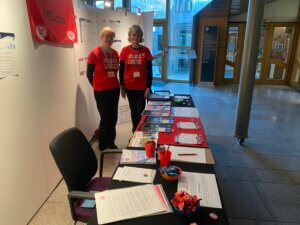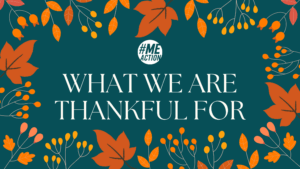The logic is crystal clear for why the National Institutes of Health (NIH) should make a serious commitment to funding research for ME/CFS. The disease affects a high proportion of Americans – estimates range from 1 to 2.5 million people; the disease is highly debilitating, leaving 75 percent unable to work and 25-29 percent housebound or bed-bound; and the disease takes an annual $17 to $24 billion toll on the economy.
And yet, the NIH clearly needs a political incentive to address the crisis of ME/CFS with real commitment. On May 12th, we plan to give the NIH that incentive by mobilizing thousands of people in every state across the country to show up for #MillionsMissing – whether from their homes because they are not well enough to leave, or on the streets – to show the NIH director, Dr. Francis S. Collins, that this disease deserves urgent attention.

Their Track Record is Abysmal
For decades, the NIH has neglected people with ME/CFS, regulating the disease to the bottom of its funding priorities. The failure of the NIH to address this disease is unconscionable given the number of people affected, and the immense burden it has on our lives and on our families.
For the past 20 years, NIH funding has averaged about $5 million annually for ME/CFS. In 2017, the budget for ME/CFS finally increased to $13 million annually after the NIH announced research funding for three Collaborative Research Centers and a data center.
Based on a report detailing the disease burden of ME/CFS – meaning the number of people affected and the effect of the disease on their lives – the annual research budget for ME/CFS should be a minimum of $200 million per year. This is a reasonable request in the context of funding for other diseases. For example, funding for multiple sclerosis was an estimated $100 million last year whereas ME/CFS is two to three times as more prevalent than MS, and has a lower quality-of-life.
ME/CFS patients score more poorly on quality of life surveys than those with multiple sclerosis, stroke, diabetes, renal failure, lung disease, heart failure, and various cancers.

The NIH is Well-Aware
The dire nature of the disease is not lost on the directors at the NIH who have publicly acknowledged the necessity of focusing attention on ME/CFS. In a Jan. 2018 interview, Collins, singled out ME/CFS as one of the priorities at the NIH that is “desperate for treatments.”
The director of the National Institute of Neurological Disorders and Stroke, Walter J. Koroshetz, M.D., said that “ME/CFS is fifty years behind,” in an interview on the White House Chronicle last fall. He made a similar comment last June, saying that ME/CFS “has been completely under-investigated,” during an NIH advisory committee hearing (see video at 2 hrs 25 mins).
It’s in their Power
The NIH has the money to fund research. In the last two years, overall NIH funding increased by $5 billion, including $3 billion in this March’s omnibus bill. The NIH also has the ability to jumpstart research for diseases that are deemed a public health crisis. For example, the NIH just announced a $1.1 billion investment into funding for opioid misuse / addiction research – a doubling of the budget with the support of Congress.
We need a results-oriented plan
In order to make tangible steps forward in improving the lives of people with ME/CFS, the NIH must focus on the end-goals that will provide relief for patients. Without a commercially-available diagnostic biomarker for ME/CFS, doctors continue to misdiagnose and mistreat patients. We are calling on the NIH to work towards a comprehensive, aggressive plan that delivers:
- A validated diagnostic biomarker which can be used within the research and clinical communities within 3 years.
- The start of NIH-funded clinical drug trials of one or more drugs as treatments within 1 ½ years.
- FDA approval of at least one drug for specific usage in ME/CFS within 3 to 5 years.
In order to achieve these goals, we are calling on the NIH to accomplish a list of initiatives over the next twelve months that will move us towards these goals. More about those initiatives to-come.
Seize the Day
On May 12th, we will speak out with a unified voice to demand justice. More than 200 visibility actions will take place across the globe – check out the map at millionsmissing.org. Now, is the time to join the rallying call to force our governments to address this health crisis.

[button_color url=”http://millionsmissing.meaction.net/” content=”Join the #MillionsMissing” target=””]
[button_color url=”https://www.indiegogo.com/projects/meaction-2018/?utm_source=%23MEAction+Newsletter&utm_campaign=82169fbfa6-EMAIL_CAMPAIGN_2018_04_25&utm_medium=email&utm_term=0_c4e623c366-82169fbfa6-350134045&mc_cid=82169fbfa6&mc_eid=d6b1aaf288#/” content=”Support the Movement” target=””]






2 thoughts on “Why we’re Targeting the NIH for #MillionsMissing”
I’m unable to type so I have to use speech to text, please excuse any grammatical or spelling errors this program makes.
I was very saddened to see that my home state of Washington has no active events plant for the millions missing. I know that I personally and unable to cognitively put together anyting. How could that spell anything wrong? Unbelievable. I am forced bye the agencies that I get any help from to go to so many different appointments monthly in order to continue to receive things that help me keep a roof over my child’s head and food in the kitchen for her. These meetings and appointments aren’t arranged with my illness imposed limits in mind. Everybody thinks I’m just being difficult and I have to go to so many it’s just making me sicker and sicker. I get so confused cognitively I can’t keep track of appointment times and paperwork and all they can do is tell me that I need to get organized and take care of this and take care of that when all I’m able to do is lay it bad to recover from all of the things Society forces me to do to survive. I absolutely fear the day that I can’t manage to scrape together enough energy to get to an appointment because we will lose every bit of help that we have. I can’t even get anybody to push my wheelchair so I have to try to walk and just getting in the front door is a Herculean effort for me and people stare when they see me struggling to move. Quite an accomplishment to stand up from the seated position for me. Has quite the public spectacle as well. I know that I can’t keep this up. I’ve had this illness long enough to know what happens with APUSH crash cycle. I’m absolutely dumbfounded my own government acknowledges how sick I am, and chooses not to care. Where’s the public outrage? They’re hearing about this disease now and they literally do not care. I’ve been ostracized by my family because of refusing to come to family events and show them that I care for them by being there. I am so tired of hearing everybody’s favorite comment, is “all you have to do is sit there”. and others trying to understand will say you can sit in the recliner . You can lean back and have your feet up. I appreciate that they’re trying when they say those things but I feel like I’m making excuses when I say it’s too much sensory processing for me to visit in a room full of people. I understand how frustrated they must be.. they probably think that no matter how hard they try nothing’s going to please me. But the fact is I want to be there with them, but I can’t do that and get so sick when I come home that I’m down for weeks at a time. I’ve gone without drinking liquids for days on end because I was too weak to get up and get something to drink. I didn’t even need to go to the bathroom. I strongly suspect that means I’m dehydrated that point. I’ve started grabbing a small plastic bag when I’m in the kitchen for any reason and grabbing things that I can drink that have lids on them and putting them in the bag. That way at least I have liquid to take my medicine and to stay hydrated during the days that I’m alone and too sick to get up at all. and for me a definition of getting up is getting out of bed walking to the restroom to use the facilities. I wash my hands and give the cat some water in a container in the tub so if they spill it it’s in the tub and not on my floor or I can slip on it. I even walk towards the kitchen and put a scoop of food and the cat food dishes. It will I get in kitchen I get something to drink with a lid on it, and look for lunch meat from the deli that I just grabbed out of the bag with my hand and eat it that way. And I’ll find some bread or crackers and eat those to make it like a sandwich. my son gets eggs that are already hard boiled the store and I’ll grab a couple of those and eat them while I’m in the kitchen. And then I grab some fruit and individual size yogurt or applesauce and take it back with me along with some paper towels. I have it down to a science and I do that once a day. That’s it. I’m in bed the rest of my life. And it’s been this way for years. Being up that long gets the pain levels going in my back oh my ribs and my shoulders. I can’t reach up without risking hurting several connective tissue areas. I have a lot of pain and it’s soft tissue pain some of it is actual arthritis and I have fibromyalgia and bursitis. So there’s a lot of pain. Being bedridden and managing fibromyalgia pain are contraindicated. I can’t take showers or baths. I just get cleansing cloths that are pre-moistened and wash up in bed. I live in the same pair of pajamas until it’s time for the next appointment when I have to get dressed and I can’t do makeup or wash my hair I hide it under a hat when I have to leave the house. I need someone to organize some kind of an event in my area so they know cuz I’m sure there are others like me that live here. There has to be. And I know they’re not getting the right treatment unless they’re able to get to Vancouver or Portland were there are actually a couple of doctors that exclusively treat and me CFS patients. I so tired now I’m in tears. they’re not emotional tears they’re exhausted tears. is there any way to get something going around here? I can’t make calls on the phone because it physically hurts and flares up muscle cramps and swollen tissues from holding the phone and my elbows lock up from being bent to hold the phone . Then when I try to straighten them usually the next day my connective tissues have shortened or gotten tight, I don’t know what happens. It just hurts really bad when I try to straighten them. I’m talking bad enough to make you cry out and pain. and my hands will be all swollen from having them in a curled position to hold onto a phone. those will hurt and I’ll start getting muscle cramps in my in the Palms the next day and several days after if I try to grasp and hold something. These things take time to heal. So I’m willing to be present even if it makes me sick if somebody can do something to try to get any kind of an event going in my area. I just need to be able to be in a lawn chair where I can recline and not fall off of when I fall asleep. Our community treats me terribly so I know anybody else with this disease is being treated just as bad and has been humiliated and ridiculed by the medical offices that we have here because they are very few and you have to go to what’s available. I have had doctors scream at me that I am sick all right, sick in the head! That is terrifying and horribly humiliating with everybody in that office he can hear it. so this community needs to take action as well. I can’t organize one one meaning an event. if anybody has any ideas or knows anybody around here I’m raising my hand saying I’m here and I’ll come and lay somewhere if there’s a bunch of people with me CFS coming together on the 12th. I keep wondering why they don’t let animals suffer but they let human beings suffer. How can our government do this to us? I’m starting to get to a point where I wondered why they don’t just put me to sleep like they would do for a dog in chronic pain and having no quality of life anymore. style like I lay in bed reading good books. I can’t even hold one. and don’t ask me to try to read something on a tablet it just does not work. Talked too long trying to explain myself yet again.
Maschelle,
Thank you for your efforts and comments, that are very much appreciated.
There will be a Millions Missing action in Seattle.
https://my.meaction.net/events/millionsmissing-visibility-action-seattle-washington-usa
Cal Anderson park from 2-4pm. Then Elliot Bay Books for treats and food 4:30pm. need RSVPs, especially for dinner.
Be sure that we intend for Frances Collins and the rest of the world to respond to our “cry-out” on May 12 and the congressional meetings scheduled for May 15. My daughter has ME/CFS and has not gone out of her home for two years except for doctor visits.
Comments are closed.